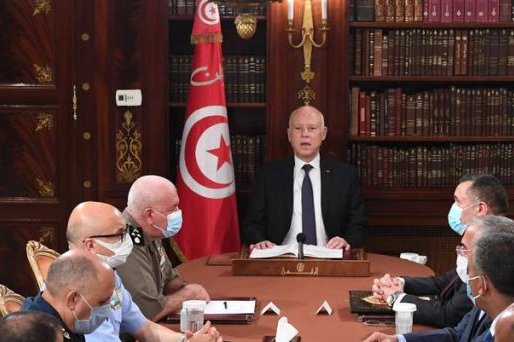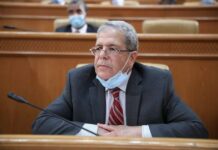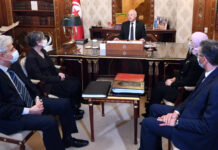Three weeks have passed since the President of the Republic announced on the night of July 25th extraordinary measures based on Chapter 80 of the Constitution, which consisted of freezing the work of parliament for a month that can be extended, lifting the immunity of deputies, dismissing the prime minister and assuming the presidency of the executive branch…
These measures have received a great popular response among all Tunisians, among many elites and other than Ennahda, as the biggest victims of these measures, which are held by the Tunisian people and a wide range of political elites responsible for the deterioration of the situation in the country, which failed to pass the coup speech and pitting part of international public opinion on the President of the Republic, the outcome of the three weeks was all positive:
The pattern of vaccination increased frequently after our country received important assistance from convergence and medical equipment and oxygen by friendly and fraternal countries where about 3 million Tunisians and Tunisians received the first dose and the percentage reached about 25 percent, which made our country the second place in Africa for those who received two doses (15 percent) after Morocco (30 percent) and we may exceed this percentage well after the open day on Sunday 15 August, which targets about 1 million of the 18-39 age group,
The President of the Republic launched a campaign against corruption, primarily targeting corruption in The Fasfat Gafsa company, as several arrests were made among a number of former senior officials, including a former minister of industry and a former secretary of state in the same ministry,
The judiciary is prosecuting a number of the 30 deputies, according to the spokesman of the Economic and Financial Judicial Pole and the fight against terrorism and those suspected of involvement in cases of corruption, bribery, terrorism and deportation… So far, a deputy has been sentenced to prison and another deputy has been arrested for assaulting the attorney general…
A former Ennahda minister and a number of judges were placed under house arrest by the minister in charge of the Ministry of Interior under the state of emergency order issued on 26 January 1978, as well as the travel ban on a number of former officials,
While these measures are well received by all Tunisians, they are not without some criticism:
With regard to the suspensions among deputies, two deputies who do not belong to large blocs or parties or to a sector such as the law sector have been targeted to date, protecting and defending them, while, for example, deputies of dignity, including those sentenced to prison terms and refusing to appear in court, are still relented and even mocked by presidential proceedings,
On the other hand, there is a fear that the war on corruption will slide into a selective process that excludes key actors, including former heads of government and senior leaders of Ennahda, the country’s first party,
The President of the Republic has so far avoided talking about political assassinations, the transfer of young people to hotbeds of tension, the secret service of Ennahda and the involvement of some parties in terrorism… Is it a secret or will these files be put on the table at the next stage?
The delay in announcing the composition of the new government and the roadmap for the next phase has become a matter of question about the true intentions of the President of the Republic and his future project, which has not been disclosed and opened the way for foreign interpretations and interventions, especially France and the United States of America, which, although they stressed their support for Tunisia and its people, did not They adopted the coup speech, but in return they are putting veiled pressure on the President of the Republic by demanding that the appointment of a prime minister be speedy to form a team “capable of addressing the urgent economic and health crises facing Tunisia” and announcing a road map for the next phase…
The suffocating economic crisis that our country is experiencing as it approaches difficult and complex negotiations with the International Monetary Fund requires the appointment of economic efficiency at the head of the government characterized by experience, experience and statesmanship and is truly able to engage in these negotiations with confidence and ability and to pass important reforms to alleviate the crisis and its repercussions on the political, social and economic conditions,
Any delay in taking such steps will undoubtedly affect the level of great confidence in the person of the President of the Republic and may have negative repercussions on the situation in Tunisia and on his relations with donor countries and funds, and may lead to unwelcome repercussions.
Translated by Rifi-JDD











